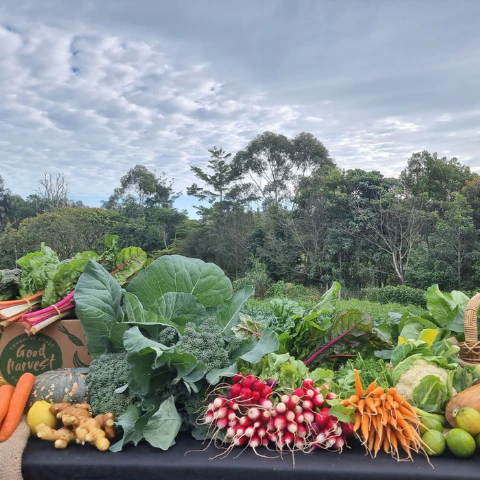In a world where convenience often takes precedence over nutritional value, it’s crucial to reassess our approach to food choices. One simple yet impactful way to enhance our well-being and support local economies is by embracing the concept of seasonal eating.
THINK ABOUT IT: Have you ever eaten a strawberry in December? I’m sure it had no taste and was the furthest from sweet. (yuck)
It wasn’t even a century ago, that those who came before us, knew what to eat during each season because they were growing the produce themselves. Most of us have no knowledge of growing our own food, yet alone the process it takes to go from harvest to grocery store aisles.
In this blog post, we’ll delve into the many benefits of picking produce based on seasons, uncovering the secrets behind tastier, more nutritious meals that are easy on the wallet. Let’s explore the top reasons why seasonal produce should be the star of your grocery list.

What is Eating Seasonal Produce?
Seasonal eating is a dietary approach that emphasizes consuming fruits, vegetables, and other foods that are currently in season. It involves aligning your diet with the natural growing cycles of plants, which can vary based on factors such as climate, temperature, and daylight hours. By choosing foods that are in season, you are likely to be selecting produce that is at its peak freshness and nutritional value.
The concept of seasonal eating is rooted in the idea that nature provides specific types of food during different times of the year to meet our nutritional needs. This approach encourages individuals to be more mindful of the availability of certain fruits, vegetables, and other food items, and to base their meal planning and choices on what is locally and seasonally abundant.
Benefits of Eating Seasonal Produce
This blog post is in no way a persuasion tactic to get you to start your own garden (even though you should because it’s fun). Instead, I’d like for you to see it as a resource to further your own understanding on why it’s important to eat seasonal produce and the benefits this tactic has on your personal health and the health of our planet.

Reason No.1 – Enhanced Nutritional Value and Flavorful Taste
Nature has a way of providing exactly what our bodies need at different times of the year. Seasonal fruits and vegetables are at their peak freshness, offering a higher concentration of essential vitamins, minerals, and antioxidants. When produce is allowed to ripen naturally under the sun, it develops a richer flavor and nutrient profile.
For instance, tomatoes in summer and winter taste vastly different due to variations in sunlight and temperature. By aligning your diet with the seasons, you’re not just savoring superior taste but also maximizing the health benefits of each bite.
Reason No.2 – Reduced Carbon Footprint
Embracing seasonal eating is an eco-conscious choice that aligns with the natural rhythm of the environment. When you consume produce in its designated season, you reduce the need for energy-intensive practices such as artificial heating, cooling, and long-distance transportation. This results in a lower carbon footprint and a more sustainable food supply chain. By opting for locally grown, seasonal fruits and vegetables, you actively contribute to ecological harmony, promoting a healthier planet for generations to come.
Most people don’t realize the amount of time and effort that goes into transporting goods from one location to the next. As consumers, we often times don’t think about the travel time, carbon emission, labor, and environmental tax required to transport produce. This is because we only see its final destination – the grocery store shelves. Eating seasonal produce allows you to unconsciously, now consciously (wink-wink!) contribute to a more sustainable food economy.
THINK ABOUT THIS: When we talk about the carbon footprint of food, the first thing we should consider is the distance it travels, or “food miles”. You can reduce the carbon footprint of your food by up to 7% by eating locally.
Reason No.3 – Support to Local Farmers
Choosing seasonal produce is not just about personal health, it’s also a powerful way to support local farmers and strengthen your community. By eating seasonally, you are doing a tremendous service to the local farmers in your community. It’s that simple! They are some of the lowest paid employees in our country and have some of the most body-taxing jobs this country has to offer.
When you buy fruits and vegetables that are in season, you’re likely purchasing from nearby farms that adhere to sustainable and environmentally friendly practices. This not only reduces the carbon footprint associated with transportation but also contributes to the economic well-being of local agricultural communities. By fostering a connection between consumers and farmers, you actively participate in building a resilient and sustainable food system.
Help them, help you, by supporting them at your local farmer’s market and don’t forget your handy produce bag to hold all of your goodies!
Reason No.4 – Costs less >> Saving Spare Funds
Seasonal produce is not only fresher and more nutritious, but it’s also often more affordable. Planning your meals around seasonal ingredients can lead to cost savings in the long run, making healthy eating more accessible and achievable for individuals and families alike.
Seasonal ingredients are, by definition, more readily available, which often times means they are cheaper. This is reflected in grocery stores as well as supermarkets. By purchasing seasonal produce, you will notice that it is typically less expensive than buying that same fruit or vegetable during its off-season. This relates to the simple concept of supply and demand; in-season produce is in large supply so it is sold at cheaper prices to maintain demand.
For example, summer is berry season, so that’s why blueberries and other berries are so inexpensive during the summer. Meanwhile, if you’re craving kiwi in July, you’ll probably pay twice as much as you would in December. Why? Kiwi is in season during the winter, so the supply is higher, lowering the price.
Reason No.5 – Diverse Culinary Adventures
Eating foods that are in season is like going on a tasty adventure in your kitchen! Every season brings different fruits and veggies with unique flavors and colors. It’s like a rainbow of delicious choices!
Trying new recipes with these fresh foods makes your meals interesting and helps you discover lots of good stuff for your body. Whether it’s colorful summer salads or warm winter soups, using what’s in season makes your kitchen a fun place to explore and enjoy yummy meals!

How to Pick Seasonal Produce
Throughout most of the year, you can often times tell what produce (especially fruits) are in and out of season. My number one tip is “airbrushed” or “glossy”; by this I mean there are no imperfections, signs of dirt – the fruit literally looks perfect.
Seasonal produce gives us the opportunity to embrace all of the imperfections of our food and appreciates its authenticity. The best seasonal produce will be locally grown. Don’t let a small bruise or bump, stop you from indulging in some yummy fruit and veggie goodness. This in fact is a good sign of integrity and that the produce has been retained rather than compromised in favor of false flawlessness.
Top Five Fruits Categorized by Season
| WINTER | SPRING | SUMMER | FALL |
|---|---|---|---|
| Beets | Asparagus | Corn | Apples |
| Citrus Fruits | Mushrooms | Zucchini | Grapes |
| Sweet Potatoes | Carrots | Berries | Butternut Squash |
| Cabbage | Collards | Avocado | Pumpkin |
| Pomegranate | Pineapple | Melons | Pears |
Click HERE to download a one page, seasonal produce guide to take with you the next time you’re shopping for groceries.
Created by sydney nikole
In conclusion, the advantages of choosing seasonal produce extend far beyond the realm of individual health.
By incorporating these fresh, flavorful gems into our daily meals, we foster a stronger connection with nature, support local economies, and contribute to a more sustainable and resilient food system. From the enhanced nutritional value to the cost-effective nature of seasonal eating, the benefits are as diverse as the fruits and vegetables themselves. So, the next time you find yourself in the grocery store, let the seasons guide your choices, and revel in the bountiful harvest that awaits you. Your taste buds, wallet, and the planet will thank you.
To find out more about the produce that’s available during each month, check out our YouTube video for more in-depth conversation.
